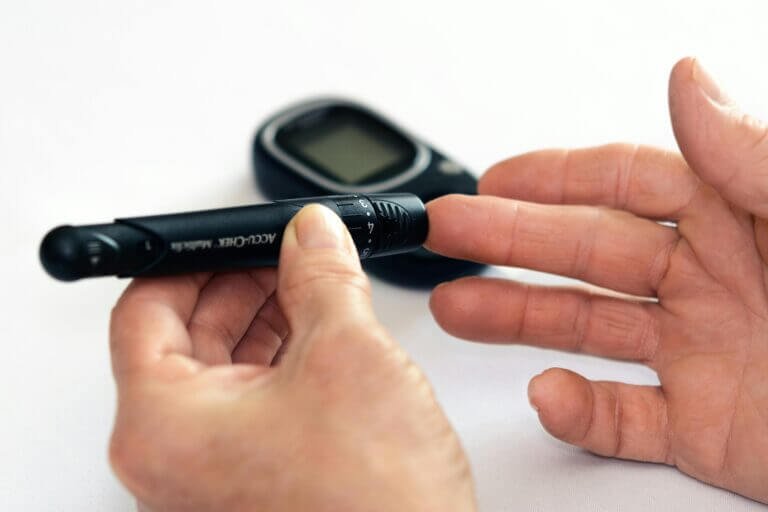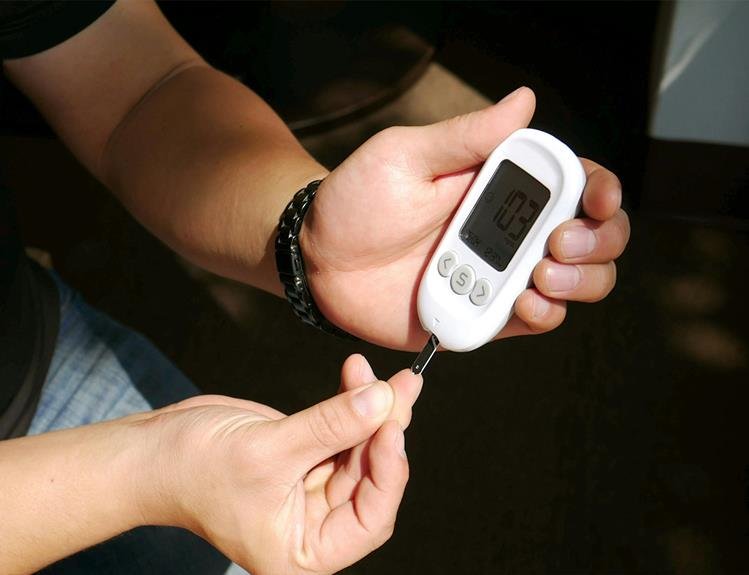The Skinny on Diabetes: Risks Symptoms and Prevention Strategies
If you've ever felt an unquenchable thirst or noticed unexplained weight loss, it might be time to consider the possibility of diabetes. But understanding the risks, symptoms, and prevention strategies goes beyond these common signs.
By exploring the intricate web of factors contributing to this chronic condition, you'll uncover the crucial role of lifestyle adjustments and early intervention in managing diabetes effectively.
So, let's unravel the complexities of diabetes together and shed light on the paths to a healthier future.
Understanding Diabetes Risk Factors
To effectively assess your risk of developing diabetes, understanding the key factors that contribute to the condition is essential. Family history plays a significant role in determining your susceptibility to diabetes. If you have close relatives with diabetes, such as parents or siblings, your risk increases.
Additionally, your weight and waist circumference are crucial factors. Being overweight, especially if you carry excess weight around your abdomen, puts you at a higher risk of developing diabetes.
Your lifestyle choices, such as physical activity levels and diet, also impact your risk. A sedentary lifestyle and a diet high in processed foods, sugar, and unhealthy fats increase your chances of developing diabetes.
Moreover, age is a factor to consider; as you grow older, your risk of diabetes tends to increase. Finally, certain medical conditions like high blood pressure and abnormal cholesterol levels can also elevate your risk for diabetes.
Understanding these risk factors empowers you to make informed decisions to prevent or manage diabetes.
Recognizing Common Diabetes Symptoms
Understanding the key factors that contribute to diabetes risk can help you recognize common symptoms associated with the condition. If you experience frequent urination, excessive thirst, unexplained weight loss, increased hunger, or blurry vision, it might be a sign of diabetes. Pay attention to persistent fatigue, tingling sensations in your hands or feet, or slow-healing wounds, as these could also indicate potential diabetes.
Feeling more irritable or dizzy than usual, having recurring skin infections, or noticing dark patches on your skin, especially around the neck or armpits, are additional symptoms to watch for. If you encounter several of these symptoms simultaneously, it's crucial to consult a healthcare professional promptly for proper evaluation.
Recognizing these common signs early on could lead to timely diagnosis and management of diabetes, helping you avoid potential complications down the road. Stay vigilant and prioritize your health by being aware of these warning signals.
Importance of Early Diabetes Detection
Early detection of diabetes is crucial as it can save lives by enabling timely intervention. By screening for risk factors such as obesity and family history, you can catch diabetes early and prevent complications.
Early Detection Saves Lives
Detecting diabetes in its early stages significantly increases the chances of successful treatment and a better overall prognosis. Early detection allows for timely intervention, which can help prevent complications such as heart disease, nerve damage, kidney problems, and vision loss.
By monitoring blood sugar levels and recognizing symptoms early on, you can work with healthcare providers to develop a personalized treatment plan that may include medication, lifestyle changes, and regular monitoring.
Ignoring warning signs or delaying diagnosis can lead to serious health consequences. Remember, knowledge is power when it comes to managing diabetes. Stay vigilant, listen to your body, and seek medical advice promptly if you suspect any potential symptoms of diabetes.
Early detection truly saves lives.
Screening for Risk Factors
Identifying key risk factors for diabetes through regular screenings is crucial for early detection and effective management. By monitoring your blood sugar levels, blood pressure, and cholesterol, healthcare providers can identify potential issues early on.
If you have a family history of diabetes, are overweight, or lead a sedentary lifestyle, it's especially important to get screened regularly. Catching diabetes in its early stages allows for prompt intervention, which can help prevent complications and improve outcomes.
Lifestyle Changes for Diabetes Prevention
Making lifestyle changes is essential for preventing diabetes and maintaining your overall health. Incorporating regular physical activity into your routine is key. Aim for at least 150 minutes of moderate aerobic exercise per week, like brisk walking or cycling. Additionally, strength training exercises twice a week can help improve insulin sensitivity and manage blood sugar levels.
Maintaining a healthy weight is crucial in diabetes prevention. Focus on a balanced diet rich in fruits, vegetables, whole grains, and lean proteins. Limit your intake of sugary beverages, processed foods, and high-fat meals.
Managing stress is also important as it can impact your blood sugar levels. Practice relaxation techniques like deep breathing, meditation, or yoga to help reduce stress.
Getting an adequate amount of quality sleep each night is vital for overall health and diabetes prevention. Aim for 7-9 hours of sleep per night to support your body's natural processes.
Dietary Strategies to Manage Diabetes
To effectively manage diabetes, focus on making healthy food choices and monitoring your carbohydrate intake. These strategies can help regulate blood sugar levels and improve overall health.
Healthy Food Choices
For effectively managing diabetes, incorporating nutrient-dense foods into your daily meals plays a crucial role in maintaining stable blood sugar levels and overall health.
Focus on consuming plenty of non-starchy vegetables like leafy greens, broccoli, and bell peppers, as they're low in calories and high in essential vitamins and minerals.
Opt for lean protein sources such as chicken, fish, and tofu to help keep you feeling full without causing spikes in blood sugar.
Choose whole grains like quinoa, brown rice, and whole-wheat bread over refined grains to increase fiber intake and promote better blood sugar control.
Snack on nuts, seeds, and Greek yogurt for healthy fats and proteins that can help regulate blood sugar levels throughout the day.
Monitoring Carbohydrate Intake
In managing diabetes, a key aspect involves closely monitoring your carbohydrate intake to effectively regulate blood sugar levels and optimize health outcomes. Carbohydrates have a direct impact on blood glucose levels, making it crucial to be mindful of the types and amounts you consume.
Focus on choosing complex carbohydrates like whole grains, fruits, vegetables, and legumes, as they're digested more slowly, leading to gradual rises in blood sugar levels. Avoid sugary drinks, sweets, and refined grains that can cause spikes in blood glucose.
Keeping track of your carbohydrate intake through food journaling or using apps can help you make informed choices and maintain stable blood sugar levels throughout the day.
Promoting Physical Activity for Diabetes Prevention
Encouraging regular physical activity plays a crucial role in preventing diabetes. Engaging in activities like brisk walking, swimming, or cycling for at least 150 minutes per week can significantly reduce your risk of developing type 2 diabetes. Physical exercise helps your body utilize insulin more effectively, lowering blood sugar levels and improving overall health.
To promote physical activity for diabetes prevention, start by incorporating small changes into your daily routine. Opt for taking the stairs instead of the elevator, parking farther away to get extra steps, or going for a short walk after meals. These simple adjustments can add up and make a big difference in your health.
Find activities you enjoy to make staying active more sustainable. Whether it's dancing, playing a sport, or practicing yoga, choosing something you love increases the likelihood of sticking with it long-term. Additionally, consider partnering up with a friend or joining a group exercise class for added motivation and accountability. Remember, every step towards a more active lifestyle is a step towards a healthier, diabetes-free future.
Frequently Asked Questions
Can Diabetes Be Prevented Entirely Through Lifestyle Changes and Dietary Strategies, or Are There Other Factors at Play?
You can significantly reduce your risk of developing diabetes through lifestyle changes and dietary strategies. While other factors may play a role, a healthy diet, regular exercise, and weight management are key preventive measures.
Are There Any Specific Types of Physical Activity That Are More Effective in Preventing Diabetes Than Others?
To help prevent diabetes, any physical activity that gets your heart rate up and makes you break a sweat is effective. Aim for a mix of aerobic exercises like running or swimming, and strength training to keep your muscles strong.
How Does Genetics Play a Role in Diabetes Risk Factors and Prevention Strategies?
Genetics can significantly influence your diabetes risk. Understanding your family history and genetic predispositions can help tailor prevention strategies. Lifestyle choices, such as diet and exercise, play a crucial role in managing genetic factors.
Are There Any Alternative Treatments or Therapies That Can Help Manage Diabetes in Addition to Traditional Medical Interventions?
You can explore alternative treatments for managing diabetes alongside traditional medical interventions. Options like acupuncture, yoga, and dietary supplements may complement your current regimen. Always consult with your healthcare provider before incorporating new therapies into your diabetes management plan.
What Are the Long-Term Effects of Diabetes on Overall Health and Well-Being, and How Can These Be Mitigated Through Prevention and Management Techniques?
You can reduce the long-term effects of diabetes on your health by managing blood sugar levels through diet and exercise. Regular check-ups, medication adherence, and a healthy lifestyle can help prevent complications and improve overall well-being.
Conclusion
Now that you have the skinny on diabetes, remember that knowledge is power. By recognizing the risk factors and symptoms early on, you can take control of your health and prevent diabetes from taking hold.
Imagine a future where you prioritize your well-being, make smart lifestyle choices, and stay active. With the right strategies in place, you can keep diabetes at bay and live a healthier, happier life.






